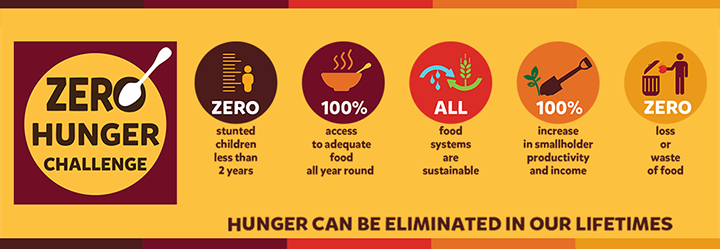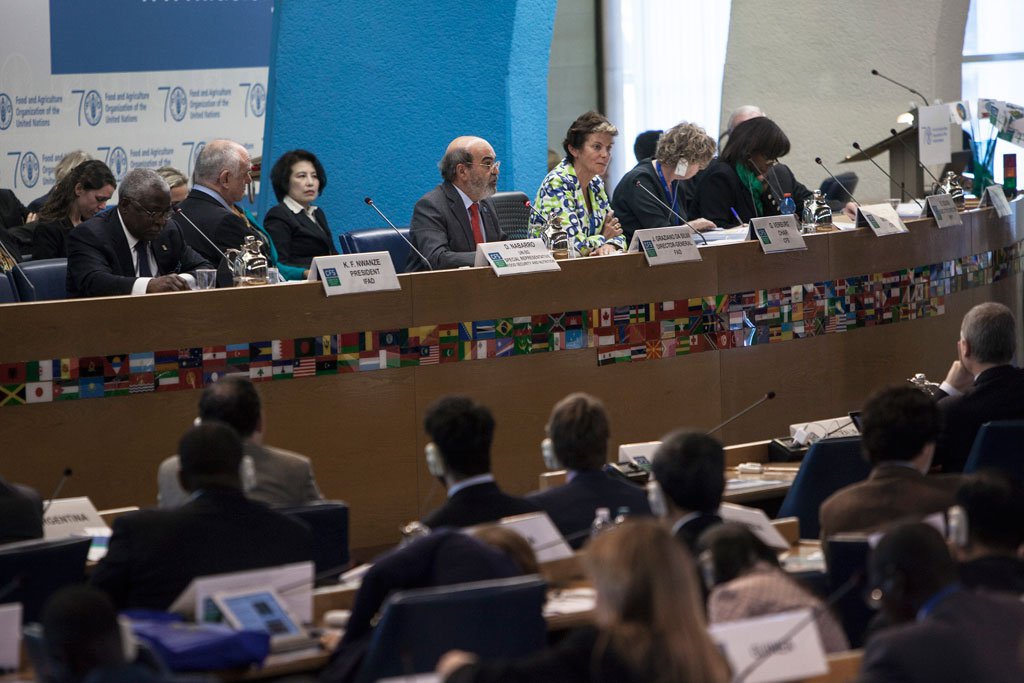If done right, agriculture, forestry and fisheries can provide nutritious food for all and generate decent incomes, while supporting people-centred rural development and protecting the environment.
Right now, our soils, freshwater, oceans, forests and biodiversity are being rapidly degraded. Climate change is putting even more pressure on the resources we depend on, increasing risks associated with disasters such as droughts and floods. Many rural women and men can no longer make ends meet on their land, forcing them to migrate to cities in search of opportunities.
A profound change of the global food and agriculture system is needed if we are to nourish today's 795 million hungry and the additional 2 billion people expected by 2050.
The food and agriculture sector offers key solutions for development, and is central for hunger and poverty eradication.
Three years after UN Secretary-General Ban Ki-moon launched his Zero Hunger Challenge, governments, groups and people around the world have built a global movement to end hunger - end it in our lifetimes, and end it once and for all.
The time has come for the world to come together in a global movement to end hunger, achieve food security and improved nutrition, and create sustainable agriculture and food systems. 2015 is a time for global action - and everyone has a part to play.
On the third anniversary of the launch of the Zero Hunger Challenge, it's time for global citizens to come together and do their part. Daily actions, big and small, can make a difference.


Marking the first international gathering on food security and nutrition since world leaders approved the Sustainable Development Goals (SDGs), the Committee on World Food Security (CFS) commenced on October 12th, 2015, focusing on ending hunger by 2030.
Director-General of the Food and Agriculture Organization of the United Nations (FAO) Jose Graziano da Silva told the assembled delegates that last month's approval of the 2030 Agenda "brings new momentum to our efforts."
"Now the world has a set date to end hunger, to achieve food security and to end malnutrition in all its forms," said Mr. da Silva. "I do not doubt that we can become the Zero Hunger generation."
Agriculture is the single largest employer in the world, providing livelihoods for 40 per cent of today's global population. It is the largest source of income and jobs for poor rural households.
500 million small farms worldwide, most still rainfed, provide up to 80 per cent of food consumed in a large part of the developing world. Investing in smallholder women and men is an important way to increase food security and nutrition for the poorest, as well as food production for local and global markets.
Since the 1900s, some 75 per cent of crop diversity has been lost from farmers' fields. Better use of agricultural biodiversity can contribute to more nutritious diets, enhanced livelihoods for farming communities and more resilient and sustainable farming systems. If women farmers had the same access to resources as men, the number of hungry in the world could be reduced by up to 150 million.


The Republic of Congo, Guinea, Mali and Niger announced a new fund for the fight against malnutrition. The announcement was made at the launch of UNITLIFE, a new innovative financing mechanism that uses micro levies from extractive industries to increase resources for the fight again malnutrition in sub-Saharan Africa.
Under UNITLIFE, participating nations with abundant natural resources will channel a small portion of revenues derived from the sale of oil, gas and mining into a UNICEF-hosted fund dedicated to improving child nutrition. For example, the Republic of Congo will contribute $0.10 per barrel of oil sold by its national state oil company.
"Chronic malnutrition in sub-Saharan Africa affects more than 1 in 3 children under the age of five, stunting their growth and threatening their cognitive capacity, thus limiting their opportunities in life," said Yoka Brandt, UNICEF Deputy Executive Director.
Every day at lunchtime, dozens of children pour into a newly built canteen next to their school in Palmiste Tampe, Haiti. They and their parents can feel safe about the food they are eating since it comes from a kitchen set up by World Central Kitchen, a non-profit organization that provides safely prepared food and education about it to schools in remote areas.
Developed by the Spanish nongovernmental organization CESAL, the project was set up to provide continuous training and support for cooks in accordance with food safety guidelines developed by the World Health Organization (WHO) alongside the Haitian health authorities.


Globally, one in nine people in the world today (795 million) are undernourished.
The vast majority of the world's hungry people live in developing countries, where 12.9 per cent of the population is undernourished.
Poor nutrition causes nearly half (45 per cent) of deaths in children under five - 3.1 million children each year.
One in four of the world's children suffer stunted growth. In developing countries the proportion can rise to one in three.
66 million primary school-age children attend classes hungry across the developing world, with 23 million in Africa alone.